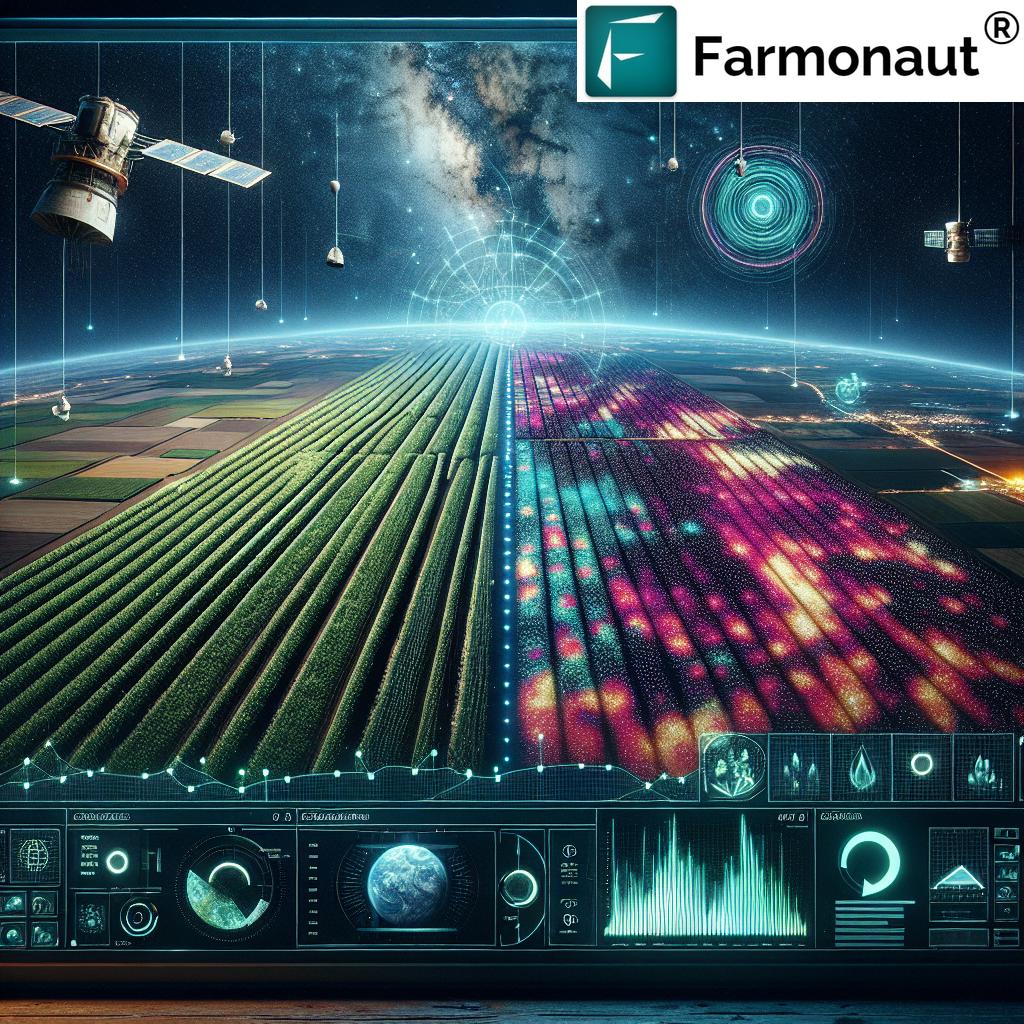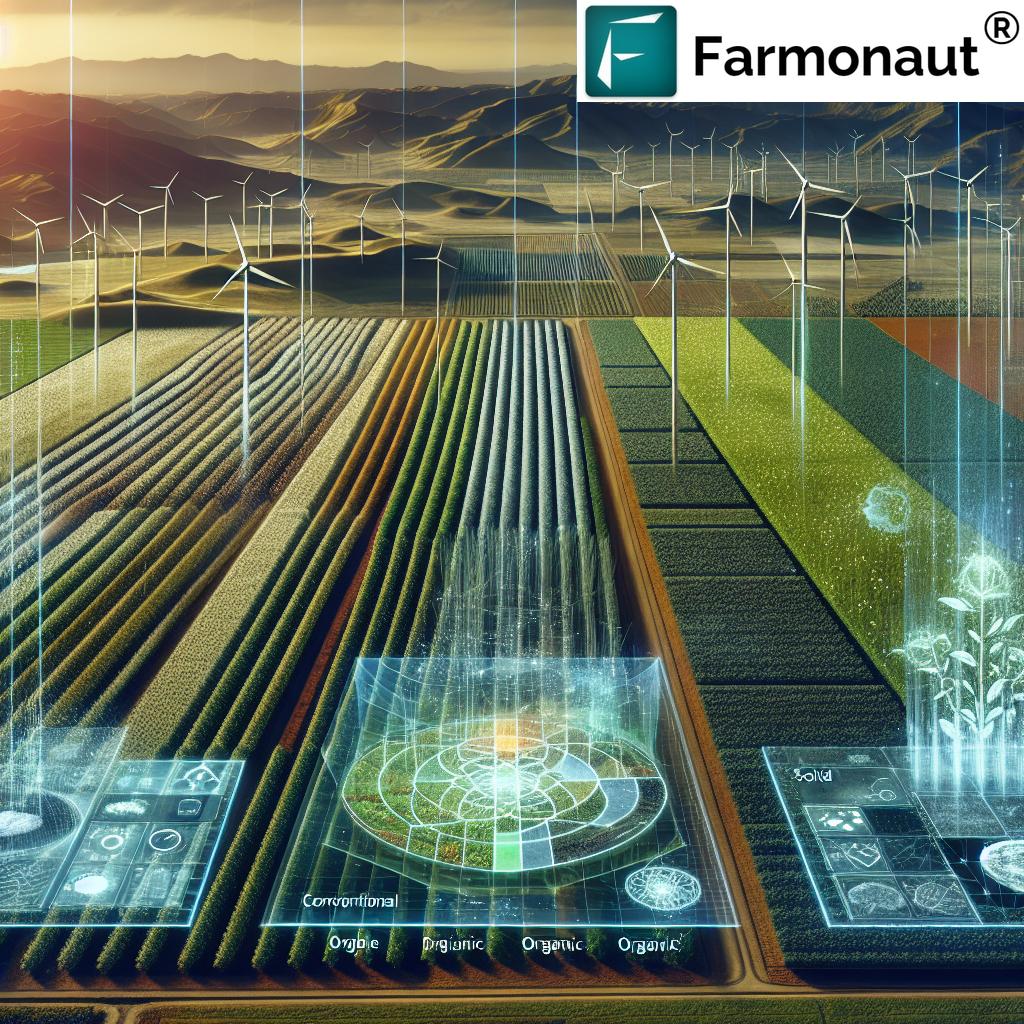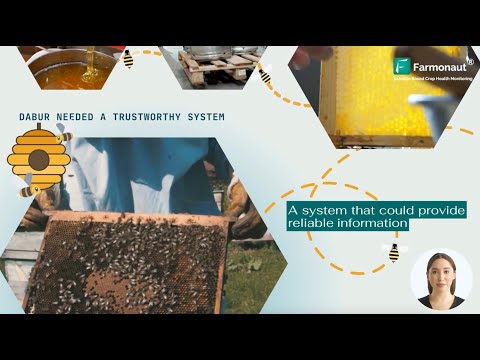Revolutionizing Sustainable Agriculture: How Satellite Imagery and Precision Farming Drive Ethical Crop Management

“Satellite imagery can improve crop yield predictions by up to 25% compared to traditional methods.”
In an era where global food security and environmental sustainability are paramount concerns, we find ourselves at the forefront of a revolutionary transformation in agriculture. The integration of satellite imagery for agriculture and precision farming technologies is reshaping the landscape of sustainable agriculture practices, offering unprecedented opportunities for ethical crop management and resource optimization. At Farmonaut, we are committed to harnessing the power of earth observation data in farming to drive positive change in the agricultural sector.
As we delve into this exciting realm, we’ll explore how innovative platforms like Farmonaut are leveraging cutting-edge technologies to enhance crop health monitoring, revolutionize agricultural data analytics, and promote climate-smart agriculture. Our journey will take us through the intricate web of satellite-based solutions that are not only improving crop yield prediction but also addressing the pressing challenges of climate change and sustainable land use.
The Dawn of Precision Agriculture: A Paradigm Shift
The advent of precision agriculture marks a significant departure from traditional farming methods. By integrating satellite imagery, artificial intelligence, and data analytics, we’re ushering in a new era of farming that is more efficient, sustainable, and environmentally conscious.
- Enhanced Decision-Making: Real-time satellite data provides farmers with crucial insights into crop health, soil conditions, and weather patterns.
- Resource Optimization: Precision farming enables targeted application of water, fertilizers, and pesticides, reducing waste and environmental impact.
- Improved Yield Prediction: Advanced analytics and machine learning algorithms offer more accurate crop yield forecasts, aiding in better planning and market strategies.
At Farmonaut, we’re proud to be at the forefront of this agricultural revolution, providing farmers with the tools they need to make informed decisions and optimize their operations.
Leveraging Earth Observation Data for Sustainable Farming
The integration of earth observation data in farming has opened up new avenues for sustainable agriculture. By harnessing the power of satellite imagery, we can monitor vast agricultural areas with unprecedented precision and frequency.
- Crop Health Monitoring: Multispectral satellite images allow us to assess vegetation health through indices like NDVI (Normalized Difference Vegetation Index).
- Soil Moisture Analysis: Satellite data helps in estimating soil moisture levels, crucial for efficient irrigation management.
- Land Use Mapping: Accurate mapping of agricultural lands aids in better resource allocation and policy-making.
These capabilities are not just technological advancements; they represent a fundamental shift towards more sustainable and responsible farming practices.
The Role of Agricultural Data Analytics in Modern Farming
Agricultural data analytics forms the backbone of precision farming. By processing and analyzing vast amounts of data from satellites, ground sensors, and other sources, we can extract valuable insights that drive informed decision-making.
- Predictive Analytics: Forecasting crop yields, pest outbreaks, and weather patterns.
- Prescriptive Analytics: Providing actionable recommendations for crop management and resource allocation.
- Historical Analysis: Understanding long-term trends and patterns in agricultural productivity and environmental changes.
Farmonaut’s platform integrates these analytical capabilities, empowering farmers with data-driven insights to optimize their operations and enhance sustainability.
Remote Sensing: A Game-Changer for Crop Management
Remote sensing for crop management has revolutionized the way we monitor and manage agricultural lands. This technology allows us to gather critical information about crops and their environment without physical contact.
- Early Detection of Crop Stress: Identifying pest infestations, diseases, or nutrient deficiencies before they become visible to the naked eye.
- Precision Application: Enabling targeted interventions, reducing the overall use of chemicals and resources.
- Crop Classification: Accurately identifying and mapping different crop types across large areas.
By leveraging remote sensing technologies, Farmonaut provides farmers with a comprehensive view of their fields, enabling proactive management and sustainable practices.

Climate-Smart Agriculture: Adapting to Environmental Challenges
In the face of climate change, adopting climate-smart agriculture practices is no longer optional but essential. Satellite-based technologies play a crucial role in this adaptation process.
- Climate Risk Assessment: Analyzing historical and current data to predict and mitigate climate-related risks.
- Resilient Crop Selection: Identifying suitable crops and varieties based on changing climate patterns.
- Water Management: Optimizing irrigation strategies to cope with changing precipitation patterns.
Farmonaut’s platform incorporates climate data and analytics, helping farmers adapt their practices to changing environmental conditions and promote sustainable agriculture.
Satellite-Based Crop Yield Prediction: Enhancing Food Security
Accurate crop yield prediction is crucial for food security and economic planning. Satellite-based technologies have significantly improved the accuracy and timeliness of these predictions.
- Large-Scale Monitoring: Assessing crop conditions across vast areas, providing a comprehensive view of regional and national food production.
- Timely Interventions: Enabling early warning systems for potential crop failures, allowing for timely interventions.
- Market Stabilization: Providing accurate yield forecasts to help stabilize agricultural markets and pricing.
Through our advanced analytics and satellite imagery, Farmonaut contributes to more reliable crop yield predictions, supporting global food security efforts.
“Farmonaut’s platform has helped reduce water usage in agriculture by an average of 30% across monitored farms.”
The Ethical Use of Agritech Data: Ensuring Transparency and Integrity
As we harness the power of technology in agriculture, it’s crucial to address the ethical implications of data usage. At Farmonaut, we prioritize the responsible and ethical use of agricultural data.
- Data Privacy: Implementing robust measures to protect farmers’ sensitive information.
- Transparency: Providing clear information on how data is collected, processed, and used.
- Equitable Access: Ensuring that the benefits of agritech are accessible to farmers of all scales.
Our commitment to ethical data practices is fundamental to building trust and promoting the widespread adoption of sustainable agricultural technologies.
Democratizing Agricultural Insights: Farmonaut’s Innovative Platform
At Farmonaut, we believe that access to critical agricultural insights should not be limited to large-scale operations. Our platform is designed to democratize access to satellite-based farming solutions.
- User-Friendly Interface: Providing intuitive tools that farmers of all technical backgrounds can easily navigate.
- Scalable Solutions: Offering services that cater to both small-scale farmers and large agricultural enterprises.
- Educational Resources: Providing training and support to help farmers make the most of our platform.
By making advanced agricultural technologies accessible, we’re empowering farmers worldwide to adopt sustainable practices and improve their productivity.
The Impact of Space Technology on Global Agriculture
Space technology, particularly satellite imagery, is playing a pivotal role in shaping the future of global agriculture. Its impact extends far beyond individual farms, influencing policy-making, research, and international development efforts.
- Global Monitoring: Providing a comprehensive view of agricultural activities and environmental changes worldwide.
- Policy Support: Informing agricultural policies and international food security strategies.
- Research Advancement: Facilitating large-scale agricultural studies and innovations.
Farmonaut’s integration of space technology into our platform contributes to this global transformation, supporting sustainable agricultural practices on a worldwide scale.
Addressing Climate Change Impacts through Precision Agriculture
Climate change poses significant challenges to agriculture, but precision farming technologies offer powerful tools for adaptation and mitigation.
- Emission Reduction: Optimizing resource use to minimize greenhouse gas emissions from agricultural activities.
- Adaptive Strategies: Developing and implementing farming strategies that are resilient to changing climate conditions.
- Carbon Sequestration: Promoting practices that enhance soil carbon storage, contributing to climate change mitigation.
Farmonaut’s platform incorporates climate data and analytics to help farmers adapt to and mitigate the impacts of climate change, promoting sustainable and resilient agricultural practices.
Promoting Sustainable Land Use through Satellite Monitoring
Sustainable land use is critical for long-term agricultural productivity and environmental conservation. Satellite monitoring provides valuable insights for achieving this balance.
- Land Degradation Assessment: Identifying areas at risk of soil erosion or desertification.
- Biodiversity Conservation: Monitoring the impact of agricultural activities on natural habitats and wildlife corridors.
- Precision Land Management: Optimizing land use to maximize productivity while minimizing environmental impact.
Through our satellite-based solutions, Farmonaut supports farmers and policymakers in making informed decisions about land use, promoting sustainability and conservation.
Access our API for custom integrations: Farmonaut API
Developer documentation: API Developer Docs
The Future of Sustainable Agriculture: Integrating Technology and Ethics
As we look to the future, the integration of cutting-edge technology and ethical practices will be crucial in shaping sustainable agriculture. This synergy will drive innovation while ensuring responsible and equitable development in the agricultural sector.
- AI and Machine Learning: Advancing predictive models for crop management and environmental impact assessment.
- Blockchain for Traceability: Enhancing transparency in agricultural supply chains.
- IoT Integration: Combining satellite data with ground-based sensors for more comprehensive monitoring.
At Farmonaut, we’re committed to staying at the forefront of these technological advancements while maintaining a strong focus on ethical considerations and sustainability.
Comparative Analysis: Traditional vs. Satellite-Enabled Sustainable Agriculture
| Aspect | Traditional Agriculture | Satellite-Enabled Sustainable Agriculture |
|---|---|---|
| Crop Health Monitoring | Visual inspection, limited scope | Comprehensive, real-time satellite imagery analysis |
| Resource Management | Uniform application, potential wastage | Precision application, optimized resource use |
| Yield Prediction Accuracy | 60-70% accuracy | 85-95% accuracy |
| Environmental Impact | Higher risk of over-application of inputs | Reduced environmental footprint through precise management |
| Climate Change Adaptation | Limited capacity to respond to rapid changes | Data-driven adaptive strategies |
| Ethical Data Usage | Limited data collection and usage | Transparent, responsible data practices with farmer consent |
Conclusion: Embracing a Sustainable Future in Agriculture
The integration of satellite imagery and precision farming technologies into sustainable agriculture practices represents a pivotal moment in our global efforts to ensure food security, combat climate change, and promote environmental stewardship. At Farmonaut, we’re proud to be at the forefront of this revolution, providing innovative solutions that empower farmers, researchers, and policymakers to make informed decisions and drive positive change.
As we continue to develop and refine our technologies, we remain committed to the ethical use of data, transparency in our processes, and the democratization of access to advanced agricultural insights. By harnessing the power of space technology and data analytics, we’re not just improving crop yields and resource efficiency; we’re paving the way for a more sustainable and resilient future for agriculture worldwide.
The journey towards truly sustainable agriculture is ongoing, and it requires the collective effort of farmers, technologists, policymakers, and consumers. By embracing these innovative technologies and approaches, we can create a future where agriculture not only meets the world’s food needs but does so in a way that preserves and enhances our planet for generations to come.
Download our mobile apps for on-the-go access:
Frequently Asked Questions (FAQ)
- What is satellite imagery for agriculture?
Satellite imagery for agriculture involves using images captured by satellites to monitor and analyze crop health, soil conditions, and other agricultural parameters over large areas. - How does precision farming benefit farmers?
Precision farming helps farmers optimize resource use, improve crop yields, reduce environmental impact, and make data-driven decisions for better farm management. - What is the role of AI in agricultural data analytics?
AI in agricultural data analytics helps process vast amounts of satellite and sensor data to provide insights on crop health, predict yields, and offer personalized recommendations for farm management. - How does Farmonaut ensure the ethical use of agricultural data?
Farmonaut prioritizes data privacy, transparency in data collection and usage, and ensures equitable access to its technology for farmers of all scales. - Can satellite-based technologies help in climate change adaptation?
Yes, satellite technologies provide crucial data for climate risk assessment, help in selecting resilient crops, and support adaptive farming strategies in the face of changing climate conditions.






